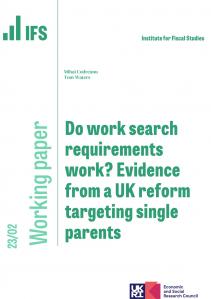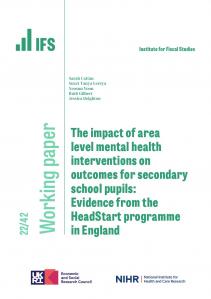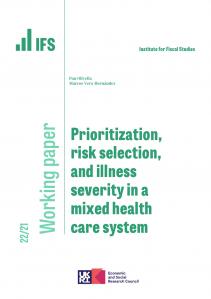Collection

After each Autumn Statement, Budget and Spending Review, we publish analysis of the Chancellor's proposals and reforms.
Briefing and analysis
The Autumn Statement 2012 was made by the Chancellor of the Exchequer, George Osborne, on Wednesday 5 December. IFS researchers presented their analysis at a briefing the following day, Thursday 6 December.
Slides are available here
- Introductory remarks, Paul Johnson
- Borrow now, cut spending later, Gemma Tetlow
- Department spending post 2014-15: (even) more cuts to come, Rowena Crawford
- Personal taxes and benefits, Stuart Adam
Chancellor George Osborne delivered his 2012 Budget in March and researchers from the Institute for Fiscal Studies presented their analysis the following day. You can download presentations on reforming the tax system, the public finances, 50p income tax rate, tax and benefit changes, business tax, stamp duty and anti-avoidance from the Budget 2012 analysis page.
The IFS Green Budget 2012 - which was produced in collaboration with Oxford Economics and supported by the ESRC - focused on the policy challenges confronting the Chancellor of the Exchequer in advance of his 2012 Budget. IFS researchers examined the outlook for the public finances, assessed a number of the key issues relating to the planned public spending cuts and discussed possible decisions on taxation. Oxford Economics analysts looked at the outlook for the global and UK macro-economy. You can download the full document, slides and videoed presentations from the IFS Green Budget page.
- A recent IFS briefing note examined the outlook for the public finances in the run-up to the Autumn Statement.
- In a recent article, Biting the bullet on fiscal targets, Carl Emmerson and Gemma Tetlow ask whether the Chancellor should abandon one of his fiscal rules in the Autumn Statement.
- In The Fiscal Challenge Ahead, IFS researchers outline the significant challenges we face as a result of the spending pressures created by population ageing and a likely loss of tax revenues from motoring and north sea oil and gas companies.
- IFS researchers produced a Briefing Note, examining the changing composition of public spending. They find that the shape of the state today is very different from that of 30 years ago and that spending on health, pensions and long term care is set to take up a far greater share of public expenditure unless there is significant reform, or unless total spending is significantly increased.
- A briefing note on Pensioners and the tax and benefit system, examines the ways in which the proposals produced by the Dilnot Commission on the Funding of Care and Support could be funded.
- A report on NHS and social care funding: the outlook to 2021/22 examines what can be expected once the current unprecedented period of broadly flat NHS funding in real terms ends in 2014-15.
- In Poverty and Inequality in the UK: 2012, IFS researchers assess the changes to average incomes, inequality and poverty, with a particular focus on the changes that have occurred in the latest year of data (2010-11).
- In an IFS observation Measuring and addressing child poverty, IFS researchers take the opportunity to reflect upon what child poverty is and how it should be measured, and to discuss current government thinking in this policy area.
- An IFS Briefing Note, Tax and benefit reforms due in 2012-13, and the outlook for household incomes, gives an overview of the tax and benefit reforms currently planned for the coming financial year and their likely impact on household incomes.
- An IFS Commentary, Child and working-age poverty from 2010 to 2020, presents forecasts of relative and absolute income poverty in the UK among children and working-age adults for each year between 2010-11 and 2015-16, and for 2020-21.
- IFS researchers have compiled a list of tax and benefit changes in each Budget since 1979.
- Stuart Adam and James Browne examine proposed reforms to council tax benefit in an IFS commentary. They look at the likely effects of localising the system of support for council tax, the distribution of funding cuts, options for local authorities and how the reformed system of council tax support could be designed to work alongside the government’s proposed introduction of Universal Credit.
- In a Fiscal Studies journal article, researchers analyse the likely effects of introducing a new Universal Credit.
- In a recent report, Fairer by design: efficient tax reform for those on low to middle incomes, Paul Johnson draws on the Mirrlees Review of taxation to identify key reforms that could help to ease the squeeze on living standards by making the UK tax and benefit systems both more efficient and fair.
- In Tax by Design, the Mirrlees Review editorial team present a picture of coherent tax reform. Its aim is to identify the characteristics of a good tax system, to assess the extent to which the UK tax system conforms to these ideals, and to recommend how it might realistically be reformed in that direction.
Our analysis for the election looked at the Labour Government’s record and at the three main UK parties' proposals. The work was funded by the Nuffield Foundation.
Collection details
- Publisher
- IFS
More from IFS
Understand this issue

Should we worry about government debt?
11 April 2024

Public investment: what you need to know
25 April 2024

The £600 billion problem awaiting the next government
25 April 2024
Policy analysis

Recent trends in and the outlook for health-related benefits
19 April 2024

4.2 million working-age people now claiming health-related benefits, could rise by 30% by the end of the decade
19 April 2024

Oil and gas make Scotland’s underlying public finances particularly volatile and uncertain
27 March 2024
Academic research

Do work search requirements work? Evidence from a UK reform targeting single parents
1 February 2023

The impact of area level mental health interventions on outcomes for secondary school pupils: Evidence from the HeadStart programme in England
13 October 2022

Prioritization, risk selection, and illness severity in a mixed health care system
16 June 2022